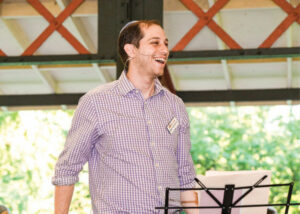
By Rabbi Tyler Dratch
Next week, many of us will gather at tables, multiple generations sitting together, for Thanksgiving dinner. Conversations across generations are not always easy, as our different life experiences lead us to varied conclusions even on most basic questions. So, it is fortuitous that this week we read Parshat Toldot, a portion about lineage and generations. What guidance might this week’s parshah have for those of us who wish to seek understanding across generations? How might we learn from each other, younger and older, and how do we pass on our values to those growing up in very different times?
In Parshat Toldot, we encounter Isaac, the patriarch who bridges generations. Isaac experiences famine and is forced to leave Canaan. God tells Isaac to stop in Grar as he journeys onward in search of food. Grar is a familiar destination to Isaac, as he knows that his father had once dug wells of water in this land. Returning now, Isaac finds that those wells had been stopped up by the Philistines in the intervening years. Instead of giving up in despair, Isaac begins to re-dig:
“Isaac dug anew the wells which had been dug in the days of his father Abraham and which the Philistines had stopped up after Abraham’s death; and he gave them the same names that his father had given them.” (Genesis 26:18)
Isaac’s digging represents ultimate continuity. The verse reminds us that these were the exact same wells that his father had dug. Isaac maintains a connection to his father’s work by giving the wells the same names they had once been called. By digging these wells in the land promised to Abraham, Isaac establishes his link in the covenant with God that he has inherited from his father.
And yet Isaac must engage in the work of re-digging in his own time. This is essential to the story. Rabbi Jacob Zvi Mecklenburg, in his work “HaKetav VeHaKabbalah,” explains that each time Abraham dug a well he gave it a name that taught about the true nature of God. By Isaac re-digging that well, he has come to similar understandings with his own two hands.
As much as we may hope that we can pass on lessons to the next generation, that perhaps they will not make the same mistakes that we once made, we know that they must dig their own wells. By coming to discoveries on their own, they will discover insights that will be most lasting in their own lives, and not only because they are important to their parents. And further, we know that the Torah has 70 faces, truth comes in 70 different forms. Maybe they will discover insights about our world and our tradition that we could not yet know, adding richness to all of our lives and life of our Jewish community,
Perhaps the best we should hope for future generations is that they are equipped with a good shovel. Hopefully they will care about the same spiritual and communal questions that we do, and yet maybe they will come to different understandings. And perhaps learning can go in both directions, younger ones benefiting from the diffing of their elders, and all of us bearing fresh fruit from the newer questions being asked.
Digging wells can be dangerous, but to be a spiritual seeker, building of Jewish community means to ask and re-ask the big questions in each generation. To engage in the sacred work of digging and re-digging our wells. Through the process of continual rediscovery, our traditions live on, and our people will continue to thrive.
Rabbi Tyler Dratch is the assistant rabbi at Beth Am.





